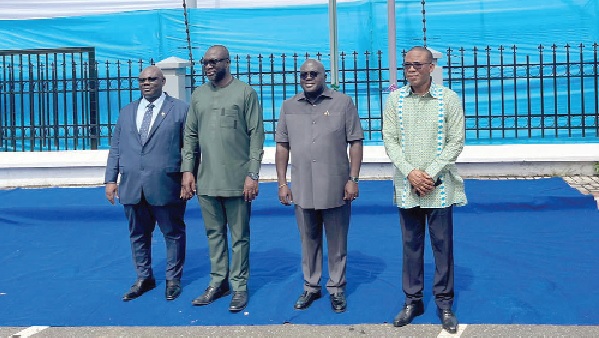The Chief of Staff, Julius Debrah, has called on the banking sector to take a central role in the rollout of the government’s 24-hour economy, stressing that the policy cannot succeed unless banks upgrade their digital systems and financing models to support businesses operating around the clock, he said.
At the inauguration of Republic Bank’s new head office in Accra, Mr Debrah said the government’s flagship 24-hour economy requires a financial system that works seamlessly at all times.
He said banks must design products that fit the cash flow patterns, risks and security needs of manufacturers, agro-processors and service providers expected to operate beyond traditional hours.
He added that without stronger digital platforms, accessible trade finance and tailored credit solutions, the gains of the policy would not be fully realised.
“The 24-hour economy forms part of the Ghana Transformation Agenda, which focuses on fiscal discipline, inclusive growth and strategic investment as the basis for economic recovery and long-term stability,” he said.
Agribusiness financing
He also placed strong responsibility on banks to back the government’s plan to reduce reliance on imported goods.
He said the agricultural value chain needs sustained financing if the country is to cut foreign exchange losses and strengthen food security, he said.
He highlighted that while the government can supply seedlings, inputs and warehouses, it is the banks that must provide capital for tractors, processing plants and storage facilities.
He praised Republic Bank for its focus on agribusiness financing, especially in cocoa-growing areas in the Western North Region, he said.
Loans to smallholder farmers and cooperatives are not only profitable but essential to job creation and national development. He said such support is the real meaning of strategic banking.
SME support
The Chief of Staff said financial inclusion remains a key national priority.
He called on banks to push innovative savings, credit and insurance products to the informal sector, supported by the digital infrastructure being deployed by the government and Telcos
He cited the bank’s mobile app and network of agents as positive examples of how financial access can reach peri-urban and rural communities.
He said micro-entrepreneurs being able to access small loans by phone, and farmers receiving payment directly into their accounts, mark genuine economic empowerment
“I urge the banks to deepen collaboration with the Ghana Interbank Payment and Settlement System to expand inclusive financial products”, he said.
He reminded the bank that SMEs remain the largest employers and must receive affordable credit supported by cash-flow-based lending models rather than traditional collateral systems.
Housing
The Chief of Staff commended Republic Bank’s contribution to national housing, saying it has become a reliable partner in efforts to reduce the country’s housing deficit of between 1.8 and 2 million units.
He also highlighted the bank’s work in sustainable finance, green banking and women’s economic empowerment.
He said the bank’s maintenance of the Africa Union Square was a visible demonstration of corporate responsibility at a time when environmental challenges are mounting.
Commitment
Board Chairman of Republic Bank PLC, Jonathan Cann, said the new head office represents the bank’s growth from humble beginnings to a stable institution.
He thanked shareholders, customers, management and staff for their contribution to the bank’s progress, he said.
He said the building symbolises a renewed commitment to supporting SMEs, agribusiness, corporates and all categories of clients.
He described the staff as the pillars who turned the bank’s mission into reality, he said.
“The bank has a new address, but its values remain unchanged and its commitment to Ghana’s future remains strong,” he said.
